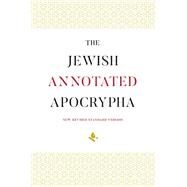- ISBN: 9780190262488 | 0190262486
- Cover: Hardcover
- Copyright: 10/1/2020
Building on the success of the Jewish Annotated New Testament (JANT) and the Jewish Study Bible (JSB), Oxford University Press now proceeds to complete the trilogy with the Jewish Annotated Apocrypha (JAA). The books of the Apocrypha were virtually all composed by Jewish writers in the Second Temple period. Excluded from the Hebrew Bible, these works were preserved by Christians. Yet no complete, standalone edition of these works has been produced in English with an emphasis on Jewish tradition or with an educated Jewish audience in mind. The JAA meets this need.
The JAA differs from prior editions of the Apocrypha in a number of ways. First, as befits a Jewish Annotated Apocrypha, the volume excludes certain texts that are widely agreed to be of Christian origin. Second, it expands the scope of the volume to include Jubilees, an essential text for understanding ancient Judaism, and a book that merits inclusion in the volume by virtue of the fact that it was long considered part of the canon of the Ethiopian Orthodox Church (the text is also revered by Ethiopian Jews). Third, it has restructured the order of the books so that the sequencing follows the logic that governs the order of the books in the Jewish canon (Law, History, Prophecy, Wisdom and Poetry).
Using the NRSV translation (plus Jubilees), each book of the Apocrypha is annotated by a recognized expert in the study of ancient Judaism. An Introduction by the editors guides readers though the making of the volume and its contents. Thematic essays by an impressive array of scholars provide helpful contexts, backgrounds and elaborations on key themes.
The JAA differs from prior editions of the Apocrypha in a number of ways. First, as befits a Jewish Annotated Apocrypha, the volume excludes certain texts that are widely agreed to be of Christian origin. Second, it expands the scope of the volume to include Jubilees, an essential text for understanding ancient Judaism, and a book that merits inclusion in the volume by virtue of the fact that it was long considered part of the canon of the Ethiopian Orthodox Church (the text is also revered by Ethiopian Jews). Third, it has restructured the order of the books so that the sequencing follows the logic that governs the order of the books in the Jewish canon (Law, History, Prophecy, Wisdom and Poetry).
Using the NRSV translation (plus Jubilees), each book of the Apocrypha is annotated by a recognized expert in the study of ancient Judaism. An Introduction by the editors guides readers though the making of the volume and its contents. Thematic essays by an impressive array of scholars provide helpful contexts, backgrounds and elaborations on key themes.






